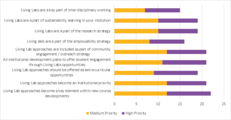Living Labs – Better Student Outcomes through Sustainability - Living Lab Guide – Implementation
Living Labs in UK & Ireland Tertiary Education
“I don’t think students are aware of what they can do… although they live and breathe on the campus they don’t think about their connection with it i.e. carrying out research on their own campus, in their own space… for some reason we remove ourselves from the environment we are so close to.” – Valeria Vargas, Manchester Metropolitan University
In 2018 EAUC and NUS shared a survey with colleagues across the tertiary education sector giving individuals and institutions the opportunity to share their engagement with and aspirations for applied learning and research. Findings from this survey have informed the basis of this document demonstrating EAUC and NUS’ roles as leaders in facilitating and contributing towards knowledge exchange and shared learning across the sector.
Living Lab Coordination
As engagement with Living Labs grows it is likely that implementation and coordination of them will also evolve. At this stage coordination of Living Labs is very varied with some institutions taking a formal approach to stakeholder engagement and project initiation, whilst other institutions take a far more informal approach. There is mixed consensus on whether one approach is better than the other, however key consideration needs to be resourcing and organisational culture.
2018 Living Lab Survey[1] feedback found that:
- 41% of respondents were aware of Living Labs being coordinated by a specific part of their institution.
- In most cases coordination was led by sustainability staff (31%), although some were teaching (17%) or estates (17%) led.
- 48% of survey respondents stated that there is no part of their institution that has overall responsibility for co-ordination or development of Living Labs.
Open answer responses to how Living Labs tend to be developed in institutions found approaches frequently happening in an ad-hoc, organic way (33% of responses) that is often led from the bottom-up or where individual staff members are particularly committed to such approaches (50% of responses).
Strategic Prioritisation
Survey respondents shared that in most cases, Living Labs do not currently feature in institutional strategies, however where they do this is most frequently in Academic Strategies (19% of respondents) or Community/ Public Engagement Strategies (17% of respondents).
Aspirations for Living Lab Approaches
Most survey respondents highlighted an institutional aspiration for the future to develop a whole institution approach for Living Labs (55%) and nearly half aspire to ensure Living Lab approaches are optional for all students.
When asked on personal aspirations for Living Labs, the highest number (52%) of survey respondents stated that they would like to see them embedded as a key element to new course developments. Half of survey respondents saw it as a medium-high priority for Living Lab approaches (see figure 3 below):
- to become an institutional priority;
- included as part of their institution’s community engagement/ outreach strategy;
- and to be included in student engagement opportunities for all institutional development plans.
[1] 42 survey respondents from universities and colleges across the UK. Survey ran from April – June 2018 and was promoted through EAUC and NUS national networks and communications.
Living Lab Engagement
Further to our findings on coordination, it was interesting to realise that most Living Lab approaches focussed on sustainability and social responsibility are being used to solve campus problems (55%). Alongside this, Living Labs tend to sit within the realms of dissertation research (52%) and other course work for students (48%).
The courses found to be engaging with Living Labs most frequently were not only those typically associated with sustainability but came from a wider range of disciplines. These course groups were (in rank order):
- Business, administration and law
- Science and mathematics
- Social sciences
Learning From Others
When asked what the sector would like to see in terms of support to progress tertiary education institutions with implementing Living Labs (see figure 4 below) the following were identified in rank order of percentage respondents:
- Case studies of best practice (67%)
- Training (67%)
- Implementation guidance (60%)
- Networking support (57%)






 Except where otherwise stated, content on this site is
licensed under a Creative Commons Attribution 3.0 License.
Except where otherwise stated, content on this site is
licensed under a Creative Commons Attribution 3.0 License.
